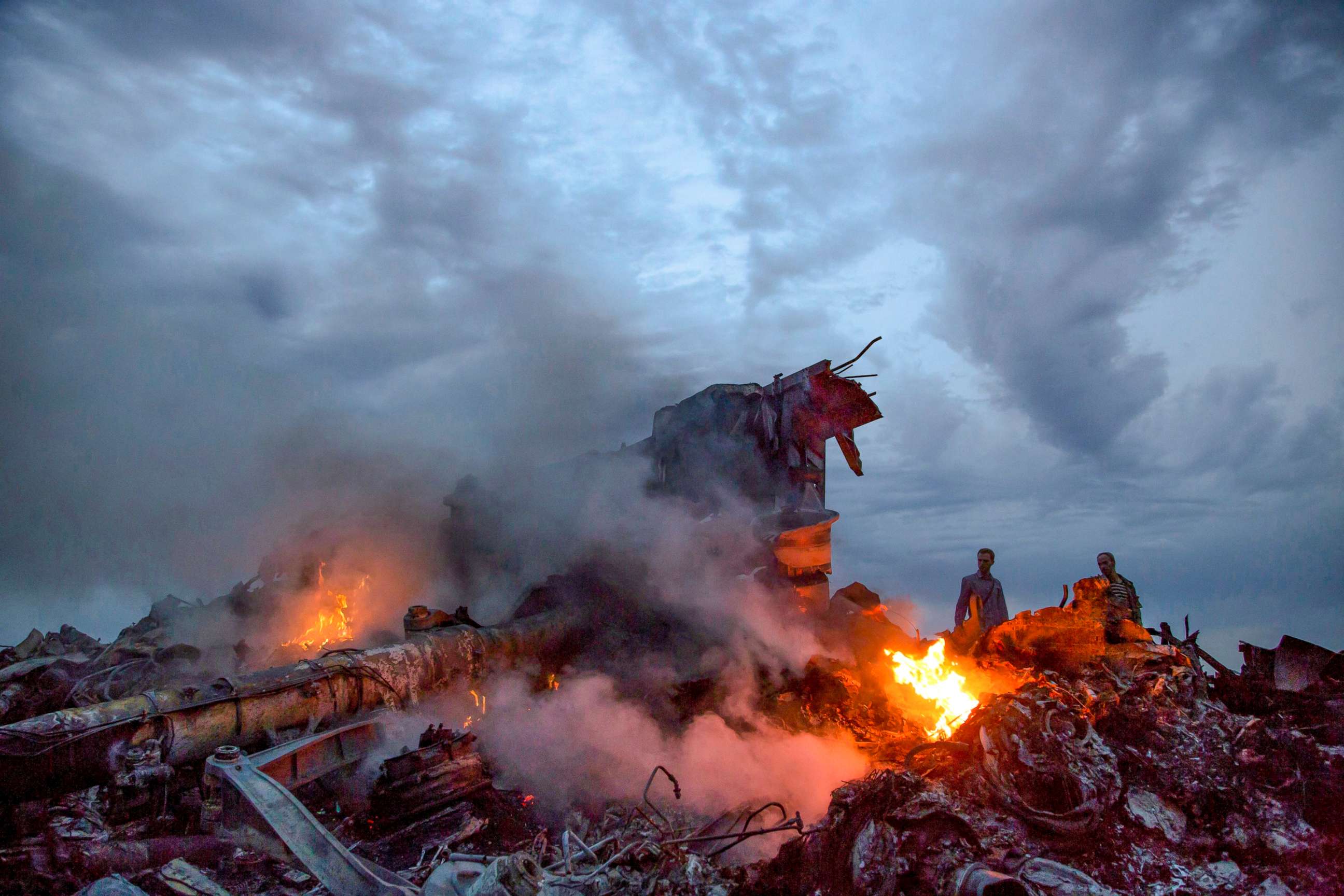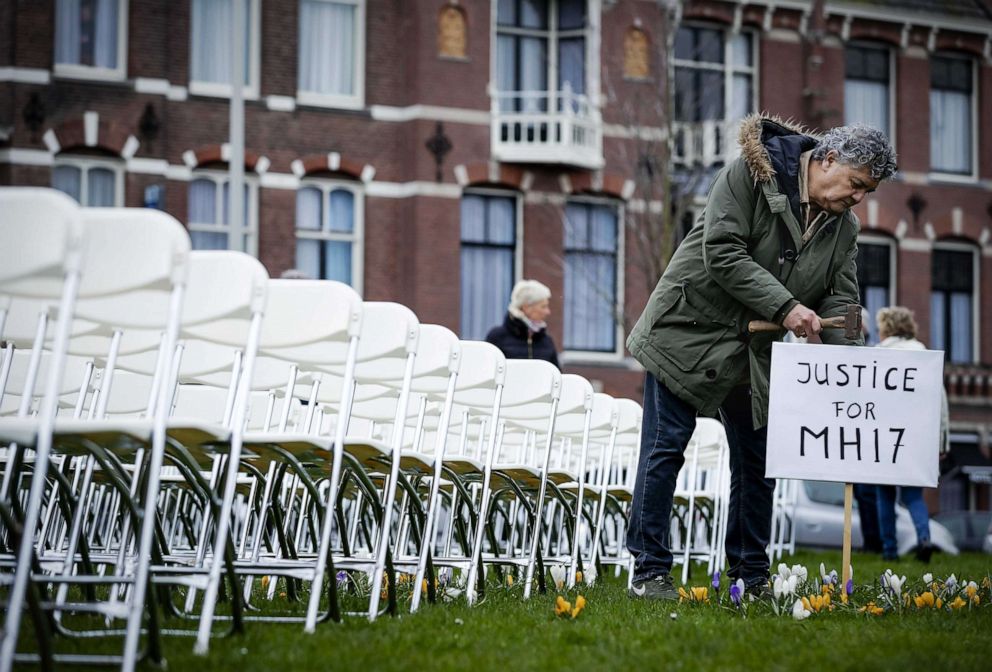Trial of suspects in shooting down of flight MH17 begins in the Netherlands
Three Russians and a Ukrainian are to be tried for the 2014 incident.
MOSCOW -- The trial of four men accused of involvement in the shooting down of Malaysian Airlines' flight MH17 over Ukraine in 2014 opened in a Dutch court on Monday, the first attempt to prosecute suspects over the disaster.
Relatives of the 298 passengers and crew killed in the crash traveled to Schiphol, near Amsterdam, where the men-- three Russians and one Ukrainian-- will be tried. None of the accused were present in the courthouse; all are currently fugitives believed to be in Russia or eastern Ukraine.
Malaysian Airlines Flight 17 was shot down on July 17, 2014, as it flew over an area of eastern Ukraine controlled by Russian-backed separatist rebels, who were fighting with Ukrainian government forces. It had been en route from Amsterdam to Kuala Lumpur.

A years-long Dutch-led international investigation involving the four other countries most affected by the incident-- Malaysia, Australia, Ukraine, Belgium-- found that the plane was brought down by a Buk anti-aircraft missile belonging to a Russian army air defense brigade, which had sent the missile and its launcher into eastern Ukraine to assist the rebels.
Last June, Dutch prosecutors said that the investigation had produced enough evidence to prosecute the four men, all commanders in the rebel forces, Igor Girkin, Sergey Dubinsky, Oleg Putlatov and Leonid Kharchenko. They are charged with the murder of the 298 victims and of causing the plane's crash.
A panel of judges opened the hearing on Monday morning in the simple, wood-paneled courtroom. “Many people have long waited for this day,” presiding Judge Hendrik Steenhuis said in his opening remarks. “This tragic loss of so many lives has touched many all over the world." He said the loss the victims' relatives had suffered was "almost inconceivable."
It's not expected that any of the four defendants will be seen in the courtroom. Girkin, Dubinsky and Kharchenko have previously told reporters they will not be attending the trial and have denied any involvement in the shooting down. They will formally be tried in absentia.
Oleg Pulatov, the fourth defendant, however, has taken on a defense team to represent him in the court to contest the charges, although he too will not appear.

Russia claims no involvement
The start of the trial opens a new stage in a long search for justice by the victims' families, many of whom have pleaded with Russia to admit its role in the disaster.
Ahead of the first hearing, family members placed 298 empty white chairs outside Russia's embassy in the Netherlands. And on Monday, the prosecution began its opening statement by solemnly reading out each of the names of the dead.
The trial is expected to last at least a year and will include testimonies from victims' relatives. So far, 49 relatives have requested to address the court, Judge Steenhuis said.
“It is very important for us because nobody had expected there would be a trial at all,” Anton Kotti, who lost three family members in the disaster, told Reuters. “We hope the judge gets so much evidence that he can only come to one conclusion: ‘guilty’.”
Russia has rejected any involvement in the incident and has refused to cooperate with the Dutch-led investigation. Russia's constitution prohibits it from extraditing its citizens, but in any case Russian officials have made clear they do not think the men should be tried.
Ahead of the trial, Russia's foreign ministry spokeswoman, Maria Zakharova, accused the Dutch government of pressuring the court. She told the BBC in a television interview that she was "100% sure that policy and politics is dominating."
For years Russian officials and state media have instead put out a series of alternative, often contradictory versions for the crash, which would push the blame onto Ukraine, while attacking the international investigation as biased. Russia's defense ministry early on published satellite images that were found to have been doctored to include a Ukrainian fighter jet close to the airliner.
The Dutch prosecutor Ward Ferdinandusse on Monday warned in court that "the smokescreen" intended to confuse the case would likely continue. He quoted the famous Russian dissident writer Alexander Solzhenitsyn: "Violence can only be concealed by lies. And lies can only maintain themselves through violence."
Airliner thought to be mistaken for Ukrainian military aircraft
The prosecutions' case is based on the international investigation-- named the Joint Investigation Team or JIT-- which has produced voluminous evidence establishing a picture of the shooting down. Through witness statements, intercepted rebel radio communications, and analyses of hundreds of images and posts on social media, as well as satellite imagery, they have also been able to track the Russian missile's path as it was brought from Russia into eastern Ukraine and then launched from rebel-held territory.
Investigations from independent journalists and researchers have coincided with the JIT's findings, which suggest the rebels accidentally shot down the airliner, mistaking it for a Ukrainian military aircraft. Intercepted radio communications released by the JIT appear to show the rebels celebrating after the shooting down of the plane, believing they had struck a Ukrainian military transport.
Prosecutors on Monday said they did not believe that the four defendants had "pressed the button" that launched the missile that downed MH17.
“However we do think that they played a significant co-ordinating role in the transportation and positioning of the Buk-TELAR and its removal back to Russia, making them so closely involved that they can be held responsible under criminal law for the downing of flight MH17," the prosecutor, Ferdinandusse told the court, using another name for the missile.
Girkin, a former colonel from Russia's FSB intelligence service known by the nom-de-guerre Strelkov, or the Shooter, was a key separatist leader in the early days of the war, serving as the self-declared defense minister in the rebel-held Ukrainian city of Donetsk. Dubinsky and Pulatov have both served in Russia's military intelligence agency, the GRU, and were Girkin's deputy and intelligence chief during the shooting down. The Ukrainian suspect, Kharchenko, led a rebel combat unit.
The investigation alleges that the men had requested Russia send the missile unit at a period when rebels were facing threats from Ukrainian warplanes.
The court on Monday ruled the trial could go ahead with Igor Girkin, Sergei Dubinsky and Leonid Kharchenko being tried in absentia, noting that it was clear from their statements to the media they were all aware they were being sought for trial and that significant efforts had been made to reach them.
“Despite knowledge of criminal prosecution, it may be assumed that they have waived their right to be present," Judge Steenhuis said.
In Moscow in recent months, Girkin has told several reporters from international media organisations, including the BBC, that he does not recognize the Dutch court's jurisdiction.
The Dutch lawyers for Pulatov told the court they had not yet had sufficient time to study the prosecutions’ case materials. But they suggested their defense would focus on the question of whether Ukraine had failed to close its airspace adequately at the time of the shooting down. They said a failure to answer that question would put in doubt the basis for prosecuting the suspects in a Dutch court. Pulatov, they said, denied involvement "in any capacity" in airliner's crash.
The trial, perhaps one of the most significant international criminal trials since the Yugoslav war crimes tribunals, has the potential for significant diplomatic fallout and may yet hold more embarrassing revelations about the Kremlin's involvement in MH17's shooting down and, more broadly, about its covert war in eastern Ukraine. The JIT investigators have already released audio recordings of rebel communications that appeared to show the role of top Russian officials, including defense minister Sergey Shoigu and the head of state security agency FSB, Alexander Bortnikov, in organizing the rebels' command structures and supplying weapons and equipment.
The Netherlands and Australia's governments have made clear to Russia that they hold it responsible for the shooting down. Dozens of relatives have signed open letters calling on Russian president Vladimir Putin to acknowledge Russia's role and to cease the disinformation campaign around the disaster.




